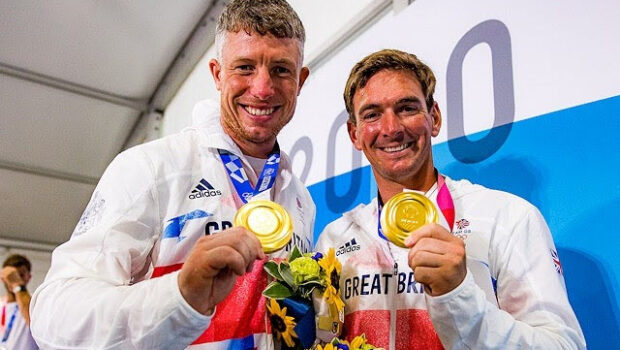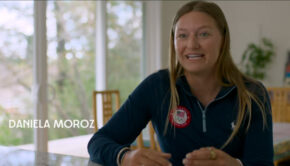From summer camp to Olympic podium
Published on July 17th, 2023
It was an exciting finish at the Tokyo 2020 Olympics when the British Team of Dylan Fletcher-Scott and Stuart Bithell claimed a dramatic Men’s Skiff gold medal, barely getting the bow of their 49er ahead of Germany in a nail-biting finish.
Now 35 years of age, Fletcher-Scott has retired from Olympic competition, and reflects on the path that claimed silver medals at the 29er Worlds and Europeans in 2006, and then took him to the podium and beyond:
What was your journey into sailing?
Neither of my parents sailed but they sent me off to learn during a summer holiday when I was 11. At 13, I started sailing a Hobie 405 at Northampton Sailing Club and from there caught the racing bug. I never looked back since!
Why did you choose the 29er and how old were you?
It was the obvious choice for stepping into the 49er for the future, and at the time, it was the cooler boat to sail compared to the 420. I started 29er sailing when I was 15.
Did you helm or crew and why?
I did a bit of both at the start, then I started sailing with Nick Hollis. We both wanted to helm but he was taller. It’s a good job I didn’t crew, looking back, as I was one of the smaller 49er helms, let alone big enough to crew!
What did you learn in the 29er that you think has helped you in your sailing beyond youth level?
It was a fantastic class to learn the skiff skills required for the 49er. Not only that, it also teaches you about sailing higher angles downwind with various modes. Modern sailing has been going more that way, not only is it fun but it helps set you up to transition into other classes and yachts down the line. With such a high-quality large fleet and one design, the racing is close and rewards the same skills required at higher levels of racing.
Do you think the 29er prepares you well for professional sailing – Olympic, Offshore and foiling sailing like SailGP and America’s Cup and why?
Absolutely, it teaches you those essential skills for sailing faster boats along with asymmetric techniques. The shorter races place a large emphasis on the start, something which is required for SailGP and Olympic sailing and it also teaches you to make decisions in less time. There is no doubt my 29er background has helped me along my journey.
What are your main strengths as a sailor and what are the biggest things you have learned in your sailing career?
This always feels like a difficult question to answer, as I want to be better in every area. Overall though I seem to have a knack for making boats go fast, have a bit of flair with decision making and enjoy the pressure of regattas. There have been many big lessons I have learnt the hard way as I am sure is the same for most. The main points being how you are able to push yourself to work harder, but also ensuring that energy is put into the right parts of the campaign. It’s all too easy to get lost in the details of sailing and miss the big picture of the campaign.
Paris 2024 Olympic Sailing Program:
Men’s One Person Dinghy – ILCA 7
Women’s One Person Dinghy – ILCA 6
Mixed Two Person Dinghy – 470
Men’s Skiff – 49er
Women’s Skiff – 49erFx
Men’s Kiteboard – Formula Kite Class
Women’s Kiteboard – Formula Kite Class
Men’s Windsurfing – iQFoil
Women’s Windsurfing – iQFoil
Mixed Multihull – Nacra 17
Venue: Marseille, France
Dates: July 26-August 11
Details: https://www.paris2024.org/en/the-olympic-games-paris-2024/
Source: International 29er Class









 We’ll keep your information safe.
We’ll keep your information safe.